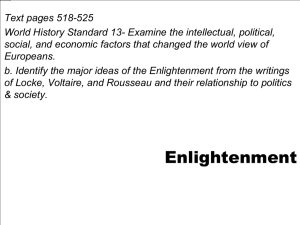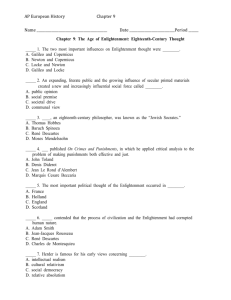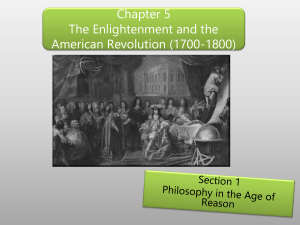Lecture 22 – The Age of European Enlightenment
advertisement
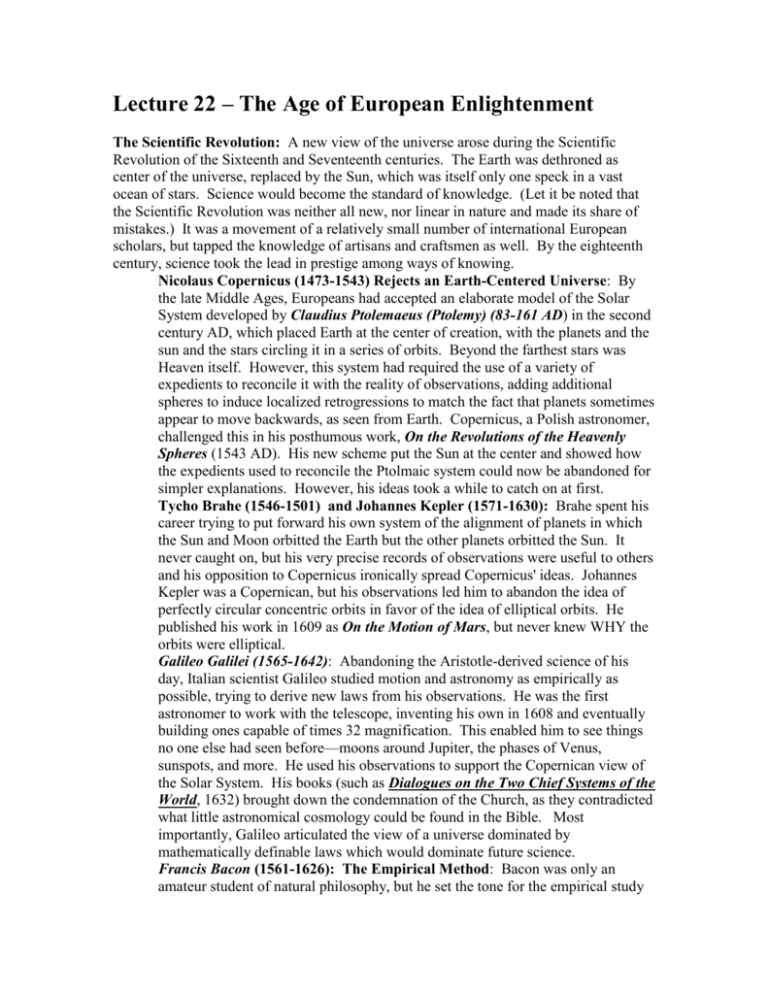
Lecture 22 – The Age of European Enlightenment The Scientific Revolution: A new view of the universe arose during the Scientific Revolution of the Sixteenth and Seventeenth centuries. The Earth was dethroned as center of the universe, replaced by the Sun, which was itself only one speck in a vast ocean of stars. Science would become the standard of knowledge. (Let it be noted that the Scientific Revolution was neither all new, nor linear in nature and made its share of mistakes.) It was a movement of a relatively small number of international European scholars, but tapped the knowledge of artisans and craftsmen as well. By the eighteenth century, science took the lead in prestige among ways of knowing. Nicolaus Copernicus (1473-1543) Rejects an Earth-Centered Universe: By the late Middle Ages, Europeans had accepted an elaborate model of the Solar System developed by Claudius Ptolemaeus (Ptolemy) (83-161 AD) in the second century AD, which placed Earth at the center of creation, with the planets and the sun and the stars circling it in a series of orbits. Beyond the farthest stars was Heaven itself. However, this system had required the use of a variety of expedients to reconcile it with the reality of observations, adding additional spheres to induce localized retrogressions to match the fact that planets sometimes appear to move backwards, as seen from Earth. Copernicus, a Polish astronomer, challenged this in his posthumous work, On the Revolutions of the Heavenly Spheres (1543 AD). His new scheme put the Sun at the center and showed how the expedients used to reconcile the Ptolmaic system could now be abandoned for simpler explanations. However, his ideas took a while to catch on at first. Tycho Brahe (1546-1501) and Johannes Kepler (1571-1630): Brahe spent his career trying to put forward his own system of the alignment of planets in which the Sun and Moon orbitted the Earth but the other planets orbitted the Sun. It never caught on, but his very precise records of observations were useful to others and his opposition to Copernicus ironically spread Copernicus' ideas. Johannes Kepler was a Copernican, but his observations led him to abandon the idea of perfectly circular concentric orbits in favor of the idea of elliptical orbits. He published his work in 1609 as On the Motion of Mars, but never knew WHY the orbits were elliptical. Galileo Galilei (1565-1642): Abandoning the Aristotle-derived science of his day, Italian scientist Galileo studied motion and astronomy as empirically as possible, trying to derive new laws from his observations. He was the first astronomer to work with the telescope, inventing his own in 1608 and eventually building ones capable of times 32 magnification. This enabled him to see things no one else had seen before—moons around Jupiter, the phases of Venus, sunspots, and more. He used his observations to support the Copernican view of the Solar System. His books (such as Dialogues on the Two Chief Systems of the World, 1632) brought down the condemnation of the Church, as they contradicted what little astronomical cosmology could be found in the Bible. Most importantly, Galileo articulated the view of a universe dominated by mathematically definable laws which would dominate future science. Francis Bacon (1561-1626): The Empirical Method: Bacon was only an amateur student of natural philosophy, but he set the tone for the empirical study of the world. In his books, such as The Advancement of Learning (1605), he condemned the scholastics for their reliance on ancient authority and their lack of thirst for new knowledge. Human knowledge needed to improve the human condition. Deeds need to lead to useful results. Observation must precede creation of logical constructs to explain nature, not follow it. Bacon looked to a future of improvements in the human condition. Bacon linked progress and science in the public mind. (Heritage, p. 643.) Isaac Newton (1642-1727) Discovers the Laws of Gravity: Isaac Newton set the basis for two centuries of physics by solving the question of what caused planetary motion to take an elliptical shape. In 1687, Newton published Principia Mathematica, which laid out the principles of planetary motion. Newton devised the theory of gravity, that masses are attracted to each other. This then shaped planetary orbits into their observable state. He proved it mathematically, but couldn't explai what actually caused gravity. (Heritage, p. 643.) Newton combined Baconian empiricism with Galileo's emphasis on mathematics; his theory would become foundational to the new scientific thought. Women in the World of the Scientific Revolution: Women were largely excluded from scientific work; the fields of academia and the universities of the time were men-only. Women were also excluded from scientific societies. Still, some noblewomen and artisans contributed to the ongoing search for knowledge. Margaret Cavendish, Duchess of Newcastle-upon-Tyne (1623-73) was an essayist, fiction writer, poet, and scientist. Her marriage to the Duke of Newcastle enabled her to engage with the natural philosophers of the day. She rejected Aristotelianism and critiqued the Royal Society for being too interested in novelties and new instruments than scientific progress. She published six books on natural philosophy, and an early work of sciencefiction, The Blazing World (an account of another planet, critiquing the gender roles, manners, and use of power on Earth). Like Thomas Hobbes, she was a materialist. Artisans: Artisan women had more freedom to pursue science than anyone else. In Germany, female astronomers worked with their husbands. Maria Winkelmann discovered a comet in 1702, and applied (unsuccessfully) to follow her husband in his job after his death. Prejudices: For centuries a combination of organized prejudice and scientific theories which treated women as inherently inferior kept women out of the sciences. John Locke (1632-1704): In addition to his political philosophy, English philosopher John Locke tried to understand the functioning of the human mind. In his Essay Concerning Human Understanding (1690), Locke argued that there are no innate ideas; at birth, every person is a blank slated shaped by events around them and by those who raise them. Human ideas are either simple ones from observation, or complex ones from prolonged thinking about experiences. Locke effectively rejected original sin in favor of behaviorism—that human behavior can be molded by outside stimuli. Locke's Two Treatises of Government (written during the Exclusion Crisis of the 1680s) argued that men form governments by contract, to protect their rights (especially property). If those rights are violated by government, then the contract is dissolved, and men may form new governments. Locke's Letter Concerning Toleration (1690) contended that governments existed to protect property, not religion; religion was a private affair. The Enlightenment (1650-1789): The philosophes were the leaders of this movement of rationalism and secularism in Europe, popularizing the new science and philosophical ideas. They called for reform of contemporary abuses. Voltaire (1694-1778): Francois Marie Arouet became better known for his pen name, Voltaire, under which he attacked religious dogmatism, absolutism, and censorship. After his arrest by French authorities in the 1720s, he fled first to England, then to Switzerland. He was a skilled poet, but is most noted for his satirical works attacking the problems of his day, especially the abuse of political and religious power. His most famous satire is Candide (1759), the adventures of an overly naive young man in Europe, which satirizes the politics and theology of his day. Voltaire contributed to the Encyclopedia, an attempt to compile all the new knowledge of its era. The Encyclopedia (1772): Under the leadership of Denis Diderot and Jean le Rond d'Alembert, over a hundred contributing philosophes assembled a massive compilation of human knowledge and critiques of the Old Regime in 17 volumes, which repeatedly came close to being shut down by the French government. Between 14-16,000 copies were sold by 1789. The goal of the project was to secularize learning and to finish off scholasticism and other old ideas. It looked to antiquity and humanity, instead of to religion and the divine. The Enlightenment and Religion: The Philosophes were anti-organized religion, seeing the Christian Churches of Europe, especially Catholics, as the enemy of the advance of knowledge and human happiness. The doctrine of original sin effectively suggested humanity could never really be improved. (Heritage, p. 648.) They believed the churches were intolerant and bigoted. Deism: Many Philosophes responded by becoming deists—they believed in a 'watchmaker God', a god who built the universe, then let it run of its own accord without interfering. In other words, they were monotheists, but not Christians, Moslems, or Jews. Nature was rational, so God must be rational and so should religion. They believed nature proved the existence of a God who would punish the wicked and reward the virtuous (rather than rewarding the 'faithful'. God would prefer a kind-hearted atheist to a staunch believer who mistreated his neighbors.) Deists hoped their beliefs would prevail, eliminating the need for the whole bigoted structure of the church, as you needed no priest to mediate between you and God; you simply had to live a virtous life. Toleration: Religious Toleration was important to the Philosophes, ending wasteful conflict between men. Voltaire was a leading champion of tolerance. Islam in Enlightenment Thought: Only in the Balkans were there many Moslems in Europe. Europeans continued to see Islam as the enemy. They attacked it for its false prophet, its false holy book, and for its willingness to paint heaveny as a place of sensual delights. It was often condemned as a very carnal religion due to its acceptance of polygamy and tales of harems. But few actually understood Islam very well. Even those who knew arabic condemned Islam. Many Enlightenment philosophes saw Islam as another religion to throw on the trashheap of history. Some philosophes, however, were less critical of Islam. Lady Mary Wortley Montagu (1689-1762) lived in Istanbul as the wife of Britain's ambassador to the Ottoman Empire; she published a set of letters about life there. She praised many aspects of life and urged adoption of the Turkish custom of innoculation against smallpox. She also praised the architecture and thought upper-class Ottoman women had more freedom than English women. (Moslems were not very well informed or curious about Christian Europe either, it must be noted.) The Enlightenment and Society: Humanity was the main interest of the philosophes. They sought to find the rules governing the functioning of human societies. The Enlightenment created the concept of social science (though not the name). Montesquieu and "The Spirit of the Laws": Charles Louis de Secondat, Baron de Montesquieu (1689-1755) was a French nobleman and magistrate. His book, The Spirit of the Laws (1748) was one of the most influential 18th century books. He used empirical evidence from many eras to deduce that there was no best government for all times and places; rather, a variety of variables determined this. Only careful examination of issues such as population size, climate, social structure, etc. could determine the best government for a country. For France, Montesquieu wanted a monarchy limited by the powers and liberties of corporate bodies—the nobility, the upper classes of the towns, the parlements (judicial courts in the French context), etc. He was a conservative reformer, wishing to end absolute monarchy, but not monarchy entirely. His most famous idea was that of separation of powers—the division of government into rival bodies whose power would check each other. In Britain, the King held executive power, the Parliament the legislative, and the courts the Judical power, for example. (Montesquieu was not aware of how changes were breaking up the seperateness of this system.) Adam Smith on Economic Growth and Social Progress: Adam Smith (17231790 AD) was an Enlightenment philosopher from Scotland. In his work, Inquiry into the Nature and Causes of the Wealth of Nations (1776), Smith attacked the system of Mercantilist regulations, saying that the free market was superior in meeting the needs of the populace for goods. He saw wealth as open-ended, not static, and argued that trade could benefit both parties, not just one. The selfish choices of individuals, channeled through the market, would bring the prosperity of all as men negotiated freely to find the highest mutual benefit. He thus became one of the fathers of laissez-faire economics, though he had his reservations on it—he supported government providing infrastructure, education, and military protection, for example. He also was aware that increasing specialization, though more economically productive, could have a cost in human terms. Smith was part of the four-stage school of human development. Humans began as nomadic hunters and gatherers, with little private property and holding tribal lands in common. Later, they became pastoralists; having herds increased the concept of private property, but land was still communal. Farming societies now turned land into private property and built cities. Commercial civilizations, such as England, built advanced cities, developed advanced financial methods, had superior agriculture and manufacturing, and lived by trade. The theory thus rated civilizations on a uniform scale of progress, with the theory's creators living in the most advanced stage. It thus could form an excuse for European imperialism— civilize the less advanced peoples with European culture! Rousseau, the State of Nature, and the General Will: Jean Jacques Rousseau (1712-78 AD) bucked the trends of his time by depicting the simpler peoples who lived closer to the governmentless state of nature as superior to civilized man, who had cut himself off from the world and his instincts. He also believed that maldistribution of property was a huge problem. He questioned the morality of any society which focused on 'progress' and wealth over human morality. Rousseau's The Social Contract (1762) addressed the problem of politics. Where most 18th century philosophers were worried about protecting people from out of control absolutist government, Rousseau focused on each man's obligations to society and the state. Humans can only achieve greatness as part of a community which is itself greater than him or her. One must create a community which encourages moral action. The citizen must obey the general will—the will of the people as expressed through collective decision making (democracy). Rousseau thus rejected Enlightenment exaltation of individual freedom from government and selfish economic choices. Where Adam Smith thought the selfish choices of individuals would lead to group prosperity, Rousseau rejected this in favor of a poorer but more moral society. The Greek Polis, especially Sparta, was an inspiration to him. Enlightened Critics of European Empire: Most Enlightenment thinkers favored the extension of European power, but some chose to criticize it. They attacked the mistreatment of the peoples of other continents. Denis Diderot, Immanuel Kant (1724-1804) and Johann Gottfried Herder (1744-1803) all criticized the abuse of American Indians, Africans, and Indians proper. They argued the shared humanity of all peoples should forbid such abuses. This also mitigated against going out and conquering these people as if they had no right to their own land. Secondly, they argued the culture of other peoples should be respected and studied, not destroyed. Thirdly, they argued that every culture was too complex to compare or judge easily. One of humanity's major characteristics was the ability to develop diverse cultures. Women in the Thought and Practice of the Enlightenment: In France, many upper class women ran salons—places where men and women gathered to discuss philosophy, history, literature, etc. Many of these women had political connections which enabled them to protect the philosophes—Louis XV's mistress Madam de Pompadour (1721-1764) protected the Encylopedia from censorship, for example. The philosophes did not advocate any radical changes in the life of women, though. Montesquieu, for example, thought that women had the same capacity for intelligence as men, yet expected them to remain subordinate in the family and that women should remain chaste. The contributors to the Encyclopedia generally did not go even so far as Montesquieu, emphasizing physical and mental weakness. (Though the articles also showed women hard at work on the work of the day.) Rousseau's Emile (1762) declared women should be raised to better suit them to serve and raise men. He showed them as inferior except in affection and fit only for the domestic sphere. Mary Wollstonecraft (1759-1797) attacked Rousseau in her Vindication of the Rights of Women (1792). She attacked Rousseau and those like him for limiting the abilities and freedom of women by trapping them in the domestic sphere. It made women merely "the sensual slaves of men." (Heritage, p. 658) Wollstonecraft demanded the same intellectual freedom for women that the philosophes had championed for men for a century. Enlightened Absolutism: In the late eighteenth century, some absolute rulers began to institute some of the reforms called for by the philosophes. Enlightened Absolutism sought to strengthen royal rule by rational strengthening of the central government. Frederick II of Prussia, Joseph II of Austria, Catherine the Great of Russia had social constraints on both their power and their reforms. "The rulers did wish to see their subjects enjoy better health, more accessible education, a more rational political administration, and economic prosperity." (Heritage, p. 659.) But they also wanted to strengthen their states to gain more power in Europe. Joseph II of Austria: He was son of Maria Theresa, and co-ruled with her from 1765 to 1780, then on his own until 1790. He lived very simply. Austria was very diverse and its possessions had a lot of autonomy. Maria Theresa had built a stronger military and imposed taxes even on the nobles. Joseph, however, wanted to end regional autonomy, especially that of Hungary. His efforts to impose stronger administration and German language there failed. He increased religious tolerance, even of Jews. He strengthened royal power over the Catholic church, making priests servants of the state taught in staterun seminaries and closing down monasteries. He further abolished serfdom and reduced burdens on peasants. In 1789, he proposed to reform the land tax to affect the wealthy as well as the poor. But his death prevented implementation. Catherine the Great of Russia (1762-1796): A german princess, she helped to overthrow her idiot husband Peter III and ruled in her own right. She tried to call a reforming commission early on; it provided important information but came to nothing in the end. She preserved noble power, but reformed local government to make it more efficient. She pushed south to the Black Sea, seizing the Crimea in 1783. The Partition of Poland: Once a mighty state, in the 16th century, Poland became an elective monarchy with a legislature that required unanimous consent to actually do anything. Over time, this crippled the Polish state, and after 1700, it increasingly fell under Russian influence, under a series of weak kings propped up by Russia. In 1772, Austria, Russia, and Prussia together forced the Poles to cede them chunks of Poland; the last King of Poland, Stanisław II August Poniatowski, supinely allowed this to take place; he only held the throne by the grace of Russia and its Polish allies. He was likewise ineffective in the face of 1793 and 1795 partitions which destroyed Poland entirely.

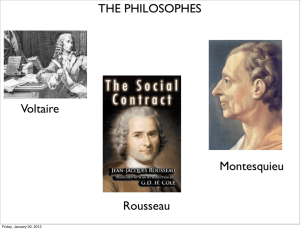
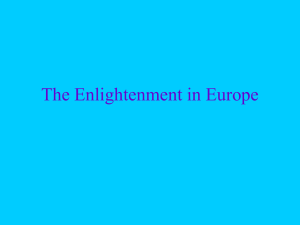

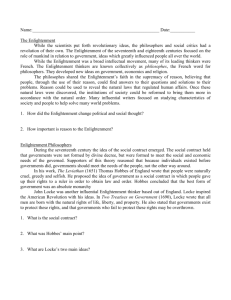
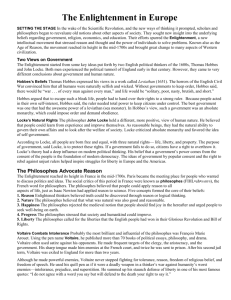
![6-2] The Enlightenment in Europe](http://s2.studylib.net/store/data/005802603_1-4aabf27e62711229ab33859d5b6ac4df-300x300.png)
